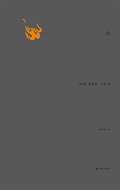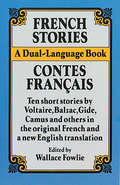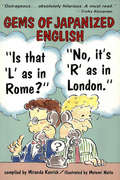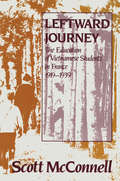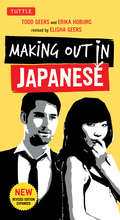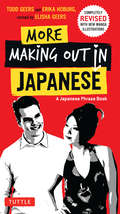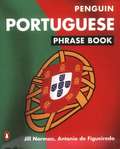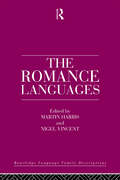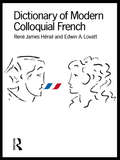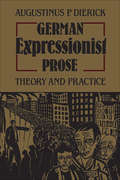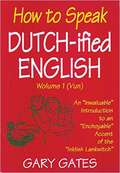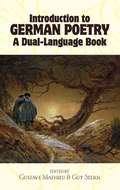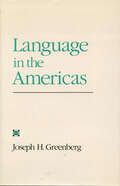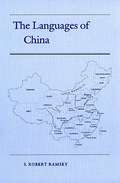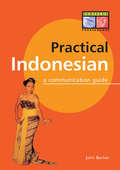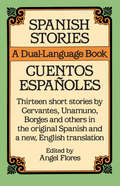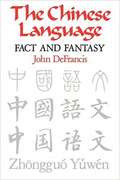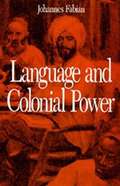- Table View
- List View
The Valentine Generation and Other Stories (Structural Readers)
by John UpdikeAn anthology of short stories from John Updike, John Wain, Doris Lessing, Frank Tuohy, H. E. Bates, and Elizabeth Taylor. After the stories are exercises in comprehension and structure.
Chinese
by Jerry NormanThis general introduction to the study of the Chinese language traces its history from its beginings in the second millennium BC to the present day and provides a clear picture of the contemporary language and its sociolinguistic status. Chinese in its numerous dialect forms, has more speakers than any language in the modern world, and this vast extension in time and space brings to its study an exceptional complexity. Nevertheless, Professor Norman handles this extraordinary range of material with a deftness of organization and lucid elegance of style that make his book of real interest to any reader with only an elementary knowledge of linguistics. It includes information on the genetic and typological connections of Chinese, traditional Chinese phonology, the writing system, the classical and early vernacular languages, the modern language and the non-standard dialects, and the history of linguistic reform in China, concluding with a discussion of present and future prospects. This latest volume in the Cambridge Language Surveys will not only be welcomed by scholars and students of the Chinese language, but also by readers with a wider interest in Chinese studies and Asian language specialists in general. Like previous volumes in the series, it makes a significant contribution to general descriptive linguistics and language typology.
Fires (Mandarin Edition)
by Raymond CarverA disparate collection of work bound by a unity of vision and obsession.本书收入卡佛的短篇小说,随笔及诗歌 小说方面 卡佛特别不满意 纽约客 文学编辑利什对 洗澡 , 所有的东西都粘在他身上 和 咖啡先生和修理先生 的删节 他改了标题 大量修改内容 都收入 火 里 谎话 , 木屋 等短篇小说则是首次有中译本 诗歌方面 收录 你们不知道什么是爱 , 在克拉马斯河附近 , 我父亲二十二岁时的照片 等著名作品 随笔方面 有 关于写作 , 我父亲的一生 , 火 等文学爱好者期待已久的篇目
French Stories/Contes Francais: A Dual-Language Book (Dover Dual Language French)
by Wallace Fowlie"The selections are good and the translations are excellent."-Germaine Brée, New York UniversityDrawn from two centuries of French literature, these superb selections by ten great writers span a wide variety of styles, philosophies, and literary creeds. The stories reflect not only the beliefs of various literary schools, but the preoccupations of French civilization, at the various times of their composition, with the metaphysical and psychological problems of man. Contents include Micromégas (Voltaire), La Messe de l'Athée (Honoré de Balzac), La Légende de Saint Julien l'Hospitalier (Gustave Flaubert), Le Spleen de Paris (Charles Baudelaire), Menuet (Guy de Maupassant), Mort de Judas (Paul Claudel), Le Retour de l'Enfant Prodigue (André Gide), Grand-Lebrun (François Mauriac), Le Passe-Muraille (Marcel Aymé), and L'Hôte (Albert Camus). Students of French, or those who wish to refresh their knowledge of the language, will welcome this treasury of masterly fiction. The selections are arranged chronologically, allowing the reader to witness the development of French literary art -- from Voltaire to Camus. Excellent English translations appear on pages facing the Original French. Also included are a French-English vocabulary list, textural notes, and exercises.
Gems of Japanized English
by Miranda KenrickJapanese do things better, this book may be the ideal antidote. Even the Japanese are quick to admit that despite their enthusiasm for learning it, they still have a certain amount of difficulty with the English language.This is no new phenomenon. Shortly after Japan opened her ports to foreign traders, one doctor advertised himself as "a Specialist in the Decease of Children"; eggs were sold as "extract of fowl" ; and a notice advised that "Tomorrow, from midnight to 12 noon, you will receive dirty water. " Fortunately, things are improving, but very slowly. A more recent English-language newspaper reported that someone's "wedding was consummated in the garden of the American consul's home," while a road sign was posted near a busy intersection that commanded drivers to "Have many accidents here."Long-time Tokyo resident Miranda Kenrick has collected these and hundreds of other delightful anecdotes to form a lighthearted, but unabashedly affectionate, portrait of the J apanese at home. R eading this book may do more for U.S.-Japan relations than a whole bookshelf of more seriousminded tomes.
Gems of Japanized English
by Miranda KenrickJapanese do things better, this book may be the ideal antidote. Even the Japanese are quick to admit that despite their enthusiasm for learning it, they still have a certain amount of difficulty with the English language.This is no new phenomenon. Shortly after Japan opened her ports to foreign traders, one doctor advertised himself as "a Specialist in the Decease of Children"; eggs were sold as "extract of fowl" ; and a notice advised that "Tomorrow, from midnight to 12 noon, you will receive dirty water. " Fortunately, things are improving, but very slowly. A more recent English-language newspaper reported that someone's "wedding was consummated in the garden of the American consul's home," while a road sign was posted near a busy intersection that commanded drivers to "Have many accidents here."Long-time Tokyo resident Miranda Kenrick has collected these and hundreds of other delightful anecdotes to form a lighthearted, but unabashedly affectionate, portrait of the J apanese at home. R eading this book may do more for U.S.-Japan relations than a whole bookshelf of more seriousminded tomes.
Leftward Journey: Education of Vietnamese Students in France
by Scott McConnellFirst Published in 2018. Routledge is an imprint of Taylor & Francis, an Informa company.
Making out in Japanese
by Todd Geers Erika HoburgMaking Out in Japanese is a fun, accessible and thorough Japanese phrase book and guide to the Japanese language as it's really spoken. Sugoku suki! Mata aeru?;(I'm crazy about you! Shall we meet again?) Answer this correctly in Japanese and you may be going on a hot date. Incorrectly, and you could be hurting someone's feelings or getting a slap! Japanese classes and textbooks tend to spend a lot of time rehearsing for the same fictitious scenarios but chances are while in Japan you will spend a lot more time trying to make new friends or start new romances; something you may not be prepared for. If you are a student, businessman or tourist traveling to Japan and would like to have an authentic and meaningful experience, the key is being able to speak like a local. This friendly and easy-to-use Japanese phrasebook makes this possible. Making Out in Japanese has been updated and expanded to be even more helpful as a guide to modern colloquial Japanese for use in everyday informal interactions; giving access to the sort of catchy Japanese expressions that aren't covered in traditional language materials. As well as the Romanized forms (romanji), each expression is now given in authentic Japanese script (kanji and kana with furigana pronunciation clues), so that in the case of difficulties the book can be shown to the person the user is trying to communicate with. This Japanese phrasebook includes: A guide to pronouncing Japanese words correctly. Explanations of basic Japanese grammar, such as, intonation, word stress, and particles. A guide to male and female usage. Romanised forms of words and phrases (romanji). Complete Japanese translations including Japanese characters (kanji) and the Japanese alphabet (kana). Useful and interesting notes on Japanese language and culture. Lots of colourful, fun and useful expressions not covered in other phrasebooks. Titles in this unique series of bestselling phrase books include: Making Out in Chinese, Making Out in Indonesian, Making Out in Thai, Making Out in Korean, Making Out in Hindi, Making Out in Japanese, Making Out in Vietnamese, Making Out in Burmese, Making Out in Tagalog, Making Out in Hindi, Making Out in Arabic, Making Out in English, More Making Out in Korean, and More Making Out in Japanese.
Making Out in Japanese
by Todd Geers Erika GeersThe books in the Making Out series are fun and accessible guides to languages as they're spoken on the street. These classic phrase books have been updated and expanded for use in informal situations such as bars, parties, or anywhere else one needs to know slang to survive! The books also now feature phrases written in their native script as well as in English, so the book can be shown to the person you are trying to communicate with. With transcriptions revised for easier pronunciation, these helpful books will have you making out in no time!Making Out in Japanese is a fun, accessible and thorough guide to Japanese as it's really spoken. It has been updated and expanded to be even more helpful as a guide to modern colloquial Japanese for use in everyday informal interactions-giving access to the sort of catchy expressions that aren't covered in traditional language materials. As well as the romanized forms, each expression is now given in authentic Japanese script (kanji kana with furigana pronunciation clues), so that in the case of difficulties the book can be shown to the person the user is trying to communicate with.
Making out in Japanese
by Todd Geers Erika HoburgThe books in the Making Out series are fun and accessible guides to languages as they're spoken on the street. These classic phrase books have been updated and expanded for use in informal situations such as bars, parties, or anywhere else one needs to know slang to survive! The books also now feature phrases written in their native script as well as in English, so the book can be shown to the person you are trying to communicate with. With transcriptions revised for easier pronunciation, these helpful books will have you making out in no time! Making Out in Japanese is a fun, accessible and thorough guide to Japanese as it's really spoken. It has been updated and expanded to be even more helpful as a guide to modern colloquial Japanese for use in everyday informal interactions-giving access to the sort of catchy expressions that aren't covered in traditional language materials. As well as the romanized forms, each expression is now given in authentic Japanese script (kanji kana with furigana pronunciation clues), so that in the case of difficulties the book can be shown to the person the user is trying to communicate with.
Making Out in Japanese
by Todd Geers Erika GeersThe books in the Making Out series are fun and accessible guides to languages as they're spoken on the street. These classic phrase books have been updated and expanded for use in informal situations such as bars, parties, or anywhere else one needs to know slang to survive! The books also now feature phrases written in their native script as well as in English, so the book can be shown to the person you are trying to communicate with. With transcriptions revised for easier pronunciation, these helpful books will have you making out in no time!Making Out in Japanese is a fun, accessible and thorough guide to Japanese as it's really spoken. It has been updated and expanded to be even more helpful as a guide to modern colloquial Japanese for use in everyday informal interactions-giving access to the sort of catchy expressions that aren't covered in traditional language materials. As well as the romanized forms, each expression is now given in authentic Japanese script (kanji kana with furigana pronunciation clues), so that in the case of difficulties the book can be shown to the person the user is trying to communicate with.
More Making Out in Japanese
by Todd Geers Erika Hoburg"Making Out in Japanese" is a fun, accessible and thorough guide to the Japanese language as it's really spoken. "Sugoku suki Mata aeru?"OCo(IOCOm crazy about you Shall we meet again?) Answer this correctly in Japanese and you may be going on a hot date. Incorrectly, and you could be hurting someoneOCOs feelings or getting a "slap " Japanese classes and textbooks tend to spend a lot of time rehearsing for the same fictitious scenarios but chances are while in Japan you will spend a lot more time trying to make new friends or start new romancesOCosomething you may not be prepared for. If you are a student, businessman or tourist traveling to Japan and would like to have an authentic and meaningful experience, the key is being able to speak like a local. This friendly and easy-to-use phrasebook makes this possible. "Making Out in Japanese" has been updated and expanded to be even more helpful as a guide to modern colloquial Japanese for use in everyday informal interactionsOCogiving access to the sort of catchy Japanese expressions that aren't covered in traditional language materials. As well as the Romanized forms ("romanji"), each expression is now given in authentic Japanese script ("kanji and kana" with "furigana" pronunciation clues), so that in the case of difficulties the book can be shown to the person the user is trying to communicate with. This phrasebook includes: A guide to pronouncing Japanese words correctlyExplanations of basic Japanese grammar, such as, intonation, word stress, and particlesA guide to male and female usageRomanized forms of words and phrases ("romanji")Complete Japanese translations including Japanese characters ("kanji") and the Japanese alphabet ("kana")Useful and interesting notes on Japanese language and cultureLots of colorful, fun and useful expressions not covered in other phrasebooks Titles in this unique series of bestselling phrase books include: "Making Out in Chinese, Making Out in Indonesian, Making Out in Thai, Making Out in Korean, Making Out in Hindi, Making Out in Japanese, Making Out in Vietnamese, Making Out in Burmese, Making Out in Tagalog, Making Out in Hindi, Making Out in Arabic, Making Out in English, More Making Out in Korean, and More Making Out in Japanese. ""
Portuguese Phrase Book
by Antonio de Figueiredo Jill NormanThis Portuguese phrase book contains useful phrases for both business and pleasure. The book includes basic grammar, a pronunciation guide and additional vocabulary.
The Romance Languages: Volume 1, Structures (Routledge Language Family Series)
by Nigel Vincent Martin HarrisAvailable again, this book discusses nine Romance languages in context of their common Latin origins and then in individual studies. The final chapter is devoted to Romance-based Creole languages; a genuine innovation in a work of this kind.
Dictionary of Modern Colloquial French
by E A Esq R. J. H 'erail E. A. LovattFirst published in 1987. Routledge is an imprint of Taylor & Francis, an informa company.
German Expressionist Prose: Theory and Practice
by Augustinus DierickAn extreme sensitivity to gathering social crisis, an accompanying angry enthusiasm for artistic experimentation and renewal – this compelling mix in German art, poetry, and drama of the period 1910 to 1925 continues to draw both scholarly attention and intense popular interest. In this book Augustinus Dierick focuses on another significant but hitherto neglected medium of German Expressionist thought – short narrative prose – in order to illuminate and evaluate the contribution of that genre to one of the twentieth century's most powerful artistic movements. Dierick's study includes a thorough analysis of the works of a broad range of Expressionist prose writers, from those of such specialists in the genre as Edschmid, Heym, Benn, Loerke, Frank, Sternheim, Ehrenstein, and 'Mynona' to the shorter prose works of such major figures as Alfred Döblin, Heinrich Mann, Max Brod, and Franz Werfel. Dierick isolates the thematic obsessions common among Expressionist writers: the pathos of the self in confrontation with nature and with God, the tension between self and the institutions of bourgeois society, and the attractions and dangers of eroticism. Throughout Dierick stresses the interrelationship between themes and their formal expression. He examines many apparent excesses in style and tone, many aberrations in structure and generic characteristics, and identifies them not as needless experimentation but as a necessary result of the attempt to find appropriate forms for extreme situations and complex ideas. Dierick's analysis makes clear that Expressionist prose has an intrinsic artistic value and, because of certain nuances and different accents, must be included in any estimation of the nature and importance of Expressionism as a whole.
How to Speak Dutch-ified English: An "Inwaluable" Introduction To An "Enchoyable" Accent Of The "Inklish Lankwitch (Vol #1)
by Gary GatesHere is a book for anyone tired of speaking flat, colorless, homogenized English. Pennsylvania Dutchman Gary Gates provides a glossary, read-aloud section, songs, recipes, and more in this delightful, inwaluble introduction to Dutch-ified English. Learn the meaning of "rutch" and "spritz," what a "clod" and a "crotch" are, how to pronounce and make "Cussin Rachel's Snitz und Knepp," and what has happened to food when it's all. As you read this book you will not only learn how to speak better, but when an American Dutchman becomes president you will understand him when he addresses the nation in Dutch-ified English.
I Am
by Rita MiliosContrasts such differences as "I am big. You are small. I am short. You are tall."
Introduction to German Poetry: A Dual-Language Book
by Guy Stern Gustave MathieuThe poems in this anthology represent a panorama of the main trends in the development of the poetry of the German-speaking people. Beginning with a minnesong of the early Middle Ages and a poem of the seventeenth century, the book then focuses on the Age of Goethe (1749-1832). Inspired by Goethe and his contemporaries, German poetry was able to develop according to its own genius and to advance along new lines that eventually led to the period of Expressionism and Post-Expressionism with which this anthology ends.Included here are the full German texts of 39 poems-lyrics, ballads, philosophical verse, humor, student songs-and three selections from longer works by Goethe, Novalis and Lenau. Some of the other poets represented are Walther von der Vogelweide, Schiller, Hölderlin, Heine, Rilke, Brecht, Hermann Hesse, Stefan George, Gryphius, Platen, Scheffel, Conrad Ferdinand Meyer and Albrecht Haushofer.For each poem, this book includes an expert literal English translation on the facing page. You'll also find a biographical and critical discussion of each poet, textual information and a portrait of the poet. Here is a wonderful opportunity to discover the depth and richness of the German poetic tradition, and learn the language at the same time.
Language in the Americas
by Joseph GreenbergThis book is concerned primarily with the evidence for the validity of a genetic unit, Amerind, embracing the vast majority of New World languages. The only languages excluded are those belonging to the Na-Dene and Eskimo- Aleut families. It examines the now widely held view that Haida, the most distant language genetically, is not to be included in Na-Dene. It confined itself to Sapir's data, although the evidence could have been buttressed considerably by the use of more recent materials. What survives is a body of evidence superior to that which could be adduced under similar restrictions for the affinity of Albanian, Celtic, and Armenian, all three universally recognized as valid members of the Indo-European family of languages. A considerable number of historical hypotheses emerge from the present and the forthcoming volumes. Of these, the most fundamental bears on the question of the peopling of the Americas. If the results presented in this volume and in the companion volume on Eurasiatic are valid, the classification of the world's languages based on genetic criteria undergoes considerable simplification.
The Languages of China
by S. Robert RamseyIn producing a book on China as a linguistic area, the ideal is a comprehensive and accurate account that places China's linguistic diversity in a meaningful historical, geographical, and social context. Ramsey has succeeded admirably in achieving this end. The Languages of China a pleasure in virtually all respects. It is extremely easy to read, full of useful information, and beautifully produced
Practical Indonesian Phrasebook: A Communication Guide
by John BarkerThis is a handy, travel-sized Indonesian phrasebook with additional information about the Indonesian language.<P><P>As any seasoned traveler knows, the ability to communicate in the language of the country you are visiting makes a very big difference in the experiences you have. Even a basic grasp of a few essentials will help you to relate to the people, get where you want to go, pay the right prices, and get much more out of your visit. That's the reason for this book which is designed especially for travelers to Indonesia and Malaysia. The emphasis is on effective communication, not grammar rules or tourist phrases. It is organized to be as simple, concise, and useful as possibly. With this book and a few hours of practice you can start communicating in Indonesian or Malay.The main focus of the book is Indonesia and Indonesian. However, since Malay is very closely related language, you will be able to make use of it quite effectively in both countries. Key features of Practical Indonesian Phrasebook are:Very compact travel sizeHundreds of useful Indonesian words and phrasesArranged by topic and situation for easy useIndonesian grammar, pronunciation and body-language guidesGlossary and appendix for easy reference and conversion to Malay
Spanish Stories: A Dual-Language Book (Dover Dual Language Spanish)
by Angel FloresDesigned for the lover of fine literature as well as the intermediate language student, this dual-language book contains 13 great, representative Spanish short stories. Chronologically arranged to illustrate the development of the story form in Spanish, the stories are presented both in Spanish and English, enabling students to learn a language while simultaneously studying literary classics. Edited by former Queens College professor Angel Flores, the volume includes brilliant works not available in any other edition published in the U.S. First-rate stories range from the medieval tales of Don Juan Manuel and the classics of Cervantes, Alarcon and Miguel de Unamuno to the highly acclaimed contemporary works of Jorge Luis Borges, Camilo Jose Cela, and Juan Goytisolo. Also included are satirical views of Spanish life by Leopolda Alas (Clarin) and Emilia Pardo Bazan, charming sketches by Ricardo Palma, and the socially and politically inspired writings of Benito Lynch and Horacia Quiroga. With this book, language students will be able to follow Spanish classics in the original while having immediate access to a complete, faithful English translation on the facing page. The dual format saves hours in word-hunting and note-taking, allowing more time for intensified study of the language, building vocabulary and practicing conversation. The present volume also contains an informative essay on Spanish literature, a biographical-critical introduction to each story, notes on obscure references and idioms and a Spanish-to-English vocabulary.Students of language and comparative literature will find the dual-language format convenient and helpful and the stories deeply satisfying; readers interested in Spanish literature will want to add this important and stimulating collection to their personal libraries.
Language and Colonial Power: The Appropriation of Swahili in the Former Belgian Congo, 1880-1938
by Johannes FabianAmong the preconditions for establishing colonial authority was communication with the colonised. Verbal exchanges depended on a shared communicative praxis providing common ground on which unilateral claims could be imposed. Use of, and control over, verbal means of communication were needed to maintain regimes - military, religious-ideological, economic - in power. In the Belgian Congo brutal physical force never ceased to be exercised. In this study Professor Fabian examines the more subtle uses of power through controls on communication, by looking at the history of Swahili as it spread from the East Coast to Central Africa and demonstrating connections between -changing forms of colonial power and the development of policies towards Swahili. Using a wide range of sources, including numerous and sometimes obscure vocabularies, he combines concepts derived from literary theory and sociolinguistics to uncover, through the flaws and failures of these texts, deep-seated attitudes to language and communication.

